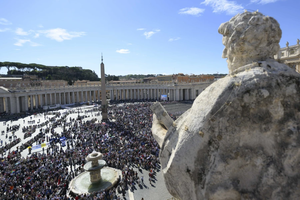Pope Francis’ Legacy: A Papacy Rooted in God’s Mercy
COMMENTARY: Pope Francis’ first words as pope spoke of his sinfulness and trust in God’s mercy — a theme that defined his entire pontificate.

As all in the Catholic Church pray for the eternal repose of the soul of Pope Francis and begin the assessment of his life and papal legacy, it’s essential to begin with how he himself viewed his life and divine calling.
He summed it up at the very moment his pontificate began.
After a pope exceeds the requisite number of votes in a conclave, he is formally asked, “Acceptasne?” — Latin for “Do you accept (your canonical election as Supreme Pontiff)?” The normal straightforward response is “Accepto” or “Non accepto.”
On March 13, 2013, Pope Francis began his convention-breaking papacy by extemporizing in Latin, “Peccator sum, sed super misericordia et infinita patientia Domini nostri Jesu Christi confisus et in spiritu penitentiae accepto” — “I am a sinner, but having relied upon the mercy and infinite patience of our Lord Jesus Christ and in a spirit of penance, I accept.”
So the very first words of his pontificate were a striking public confession of his sinfulness, his desire for penance, and his deep trust in Divine Mercy.
When Jesuit Father Antonio Spadaro asked him in a 2013 interview, “Who is Jorge Mario Bergoglio?” the Holy Father elaborated: “I am a sinner whom the Lord has looked upon” with mercy, adding, “I always felt my motto, Miserando atque Eligendo, was very true for me,” meaning that the Lord, having looked upon him with merciful love [miserando], chose him [eligendo] first to be a priest and religious, then a bishop, and finally the successor of St. Peter.
His motto takes us back to the recognition of his priestly vocation, which happened on Sept. 21, 1953, the feast of St. Matthew, when he was 16.
It was the first day of spring in Argentina and a school holiday. He stopped into his parish church to say a quick prayer and saw a priest he didn’t know, Father Carlos Duarte Ibarra. Somewhat on the spur of the moment, young Jorge Bergoglio asked him to hear his confession. Five minutes later, he exited, with his heart no longer set on becoming a chemist, but convinced God was calling him to be a priest.
As he shared multiple times throughout his papacy, he recognized in the confessional that, even though his request seemed spontaneous, God had been waiting for him there to fill him with his mercy and to make him a messenger and minister of that mercy to others.
Reflecting years later on his vocation in light of St. Matthew’s call, he was moved by the commentary of St. Bede the Venerable that the Church ponders every Sept. 21: Jesus “saw the tax collector and, because he saw him through the eyes of mercy and chose him [miserando atque eligendo], he said to him: ‘Follow me.’”
He saw the three words of his motto as the summary of his life, priesthood, episcopacy and papacy.
The night he was elected, I was in Rome doing television commentary for EWTN and BBC International. After celebrating, conducting interviews and filing an article, I tracked down a digital copy of a 2010 book-length interview with him entitled, El Jesuita, which I speed-read before bed to help prepare for media appearances the next day. I got to one passage, however, that I couldn’t race through. In fact, despite my fatigue, I read it slowly three times.
It was one of the deepest understandings of Divine Mercy I had ever found, including in the very rich pontificates of Pope Francis’ two immediate predecessors. In it, then-Cardinal Bergoglio stated that authentically Christian discipleship begins with our recognition that we’re sinners in need of salvation and is meant to flourish in the concomitant experience that that Savior looks on us with merciful love.
“For me,” he said, “feeling oneself a sinner is one of the most beautiful things that can happen, if it leads to its ultimate consequences. … When a person becomes conscious that he is a sinner and is saved by Jesus … he discovers the greatest thing in life, that there is someone who loves him profoundly, who gave his life for him.”
He lamented that many Catholics have sadly not had this fundamental Christian experience: “There are people who believe the right things, who have received catechesis and accepted the Christian faith in some way, but who do not have the experience of having been saved … and who therefore lack the experience of who they are. I believe that only we great sinners have this grace.”
After his election, he added, “Only the one who has been touched and caressed by the tenderness of his mercy really knows the Lord.”
On the first Sunday of his papacy, I was in St. Peter’s Square as he sought to open up both the Church and the world to this grace. In his homily at the Vatican’s parish church of St. Anne and in his meditation from the window of the Apostolic Palace, overlooking a crowd of 300,000, he stressed what he had discovered back on Sept. 21, 1953. The Gospel that day was on Jesus’ forgiving the woman caught in adultery (John 8:1-11). And the new Holy Father, in eloquent Italian that provoked in me chills and tears, said with words thereafter indelibly inscribed within my memory, “The Lord never tires of forgiving. Never! It is we who tire of asking for his forgiveness. Let us ask for the grace never to tire of asking for what God never tires to give.”
Later in his papacy, he said that the “whole Gospel, all of Christianity,” is contained in the joy God has in forgiving us. The “most profound mission of Jesus,” he stated, “is the redemption of all of us sinners.” Mercy is God’s “most powerful message,” God’s “name” and “identity card.” Mercy, he added, is “the very foundation of the Church’s life” and her “primary task.” It is the “force that can save man and the world.”
Because of these convictions, he announced a Jubilee of Mercy in 2015-2016 to help the Church “rediscover the meaning of the mission entrusted to her by the Lord on the day of Easter: to be a sign and an instrument of the Father’s mercy.” He instituted the “Missionaries of Mercy,” originally about 1,100 of the 410,000 priests in the world, to be “persuasive preachers of mercy” and “living signs of the Father’s readiness to welcome those in search of his forgiveness” through their dedication to hearing confessions. He gave them special faculties in the confessional to remit the censures and heal the sins that are normally reserved only to the Holy See.
At the end of the Jubilee, he extended the faculties of willing missionaries indefinitely; and in his new apostolic constitution for the Church published in 2022, he made the Missionaries of the Mercy a permanent part of the structure of the Church.
Throughout his papacy, he sought to give greater attention to those he deemed in special need of God’s mercy, to those on the “existential peripheries,” to the lost sheep, rather than those still in the fold. That preference for the one over the 99 (Luke 15:3-7) was often a source of frustration and confusion for many of the faithful, as the Pope prioritized meeting with atheist reporters, fallen-away Catholics, critics of the Church, LGBTQ activists, pro-abortion politicians, tarred ecclesiastical figures and others, rather than with some devout members of the Curia, episcopate and flock. To use one of Pope Francis’ most famous metaphors, he seemed sometimes to have the “smell” of the lost and black sheep better than he did those washed in the Blood of the Lamb who were trying to follow the Good Shepherd’s voice.
This focus on the lost sheep, however, did not mean that he was unaware of, or indulgent toward, their sins. Several times he made a distinction between what he called “sinners” and the “corrupt.” Sinners, he said, were those who recognized they had fallen and needed God’s forgiveness; the “corrupt” were those who were so hardened in sin that they treat vice as virtue and never repent.
“Mercy exists,” he wrote, “but … if you don’t recognize yourself as a sinner, it means you don’t want to receive it.” When asked, for example, about his well-known words, “Who am I to judge?” — made in response to a question about a priest caught in a same-sex sexual scandal — he made clear, “I prefer that [practicing] homosexuals come to confession, stay close to the Lord, and that we all pray together.” Most of the news sources that gave his question front-page headlines, however, somehow didn’t have room for his clarification.
Pope Francis often spoke and acted in ways, it must be stated, that confused his message on mercy.
While calling people to confession and telling them not to be afraid, he somehow couldn’t refrain from routinely begging priests publicly not to turn the confessional into a “torture chamber,” as if he believed that such words about imaginary sacerdotal sadists would somehow give sinners confidence rather than anxiety.
He sometimes, moreover, seemed to be indulgent toward the publicly corrupt and unrepentant, like certain notorious bishops and priests guilty of sexual abuse as well as dictators and regimes trampling the dignity of their people.
On the other hand, he often seemed harsh and uncompromising toward members of his Curia, conservative political leaders and ecclesiastical figures, those who love the Latin Mass, and diocesan priests and seminarians, who never seemed to get the fatherly encouragement he gave his fellow Jesuits.
But even if his message about mercy may have been muddled by occasional failures to practice what he preached, his emphasis on the message is, without question, one of his greatest legacies.
The Church, he said, is “called above all to be a credible witness to mercy, professing it and living it as the core of the revelation of Jesus Christ.” He aspired throughout his priestly life and papacy to be that type of credible witness and make that proclamation.
We now entrust him to that mercy he sought to proclaim to the end.
- Keywords:
- Interregnum















